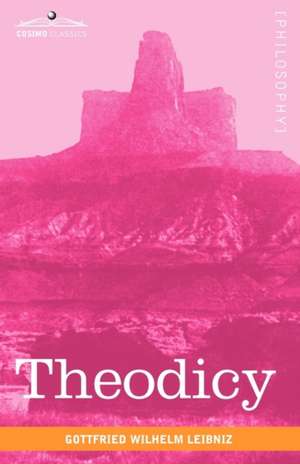Theodicy
Autor Gottfried Wilhelm Leibniz Editat de Austin M. Farrer Traducere de E. M. Huggarden Limba Engleză Paperback – 30 iun 2010
| Toate formatele și edițiile | Preț | Express |
|---|---|---|
| Paperback (3) | 129.89 lei 6-8 săpt. | |
| Open Court Publishing Company – 30 noi 1988 | 281.10 lei 3-5 săpt. | |
| Lector House – 26 iul 2019 | 129.89 lei 6-8 săpt. | |
| COSIMO CLASSICS – 30 iun 2010 | 171.58 lei 6-8 săpt. |
Preț: 171.58 lei
Nou
Puncte Express: 257
Preț estimativ în valută:
32.83€ • 35.78$ • 27.67£
32.83€ • 35.78$ • 27.67£
Carte tipărită la comandă
Livrare economică 23 aprilie-07 mai
Preluare comenzi: 021 569.72.76
Specificații
ISBN-13: 9781616402952
ISBN-10: 1616402954
Pagini: 450
Dimensiuni: 140 x 216 x 25 mm
Greutate: 0.57 kg
Editura: COSIMO CLASSICS
ISBN-10: 1616402954
Pagini: 450
Dimensiuni: 140 x 216 x 25 mm
Greutate: 0.57 kg
Editura: COSIMO CLASSICS
Descriere
Descriere de la o altă ediție sau format:
In order to be truly free, must you act arbitrarily? If an event did not happen, could it have happened? Since there is evil, and God could have made the world without evil, did God fail to pick the best course? Grappling with such simple--yet still intriguing--puzzles, Leibniz was able to present attractively his new theories of the real and the phenomenal, freewill and determinism, and the relation between minds and bodies. Theodicy was Leibniz's only book-length work to be published in his lifetime, and for many years the work by which he was known to the world. Fully at home with the latest scienctific advances, Leibniz ultimately rejected the new atomistic philosophies of Descartes, Gassendi, and Hobbes, and drew upon the old cosmology of Aristotelian scholasticism. There could be no conflict, he argued between faith and reason, freedom and necessity, natural and divine law. Ingeniously defending his postulate of pre-established harmony, Leibniz made important advances in the precise analysis of concepts.
